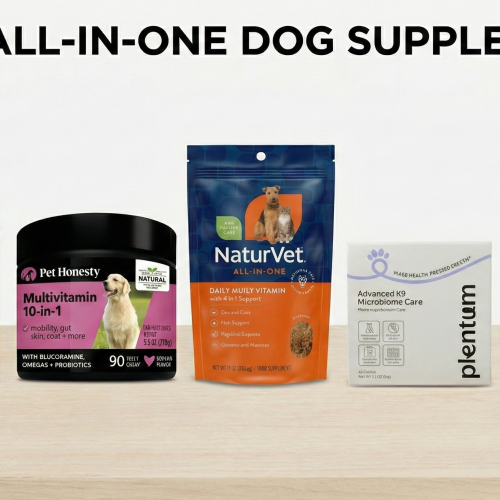As a practicing veterinarian with over fifteen years of experience in companion animal medicine, I encounter this question almost daily from concerned pet owners. The short answer is nuanced: most healthy dogs eating high-quality, AAFCO-approved commercial diets do not need additional supplementation, but specific circumstances may warrant targeted nutritional support.
The Foundation of Canine Nutrition
In my practice, I consistently emphasize that complete and balanced commercial dog foods meeting AAFCO (Association of American Feed Control Officials) standards are formulated to provide all essential nutrients. These foods undergo rigorous testing to ensure they meet the nutritional requirements established for dogs at different life stages. When owners ask about supplements, I first evaluate whether their dog is receiving an appropriate base diet.
The reality is that most commercial dog foods, when properly formulated, contain adequate levels of all essential nutrients. A recent study analyzing Canadian dog foods found that 25 of 27 tested foods met or exceeded AAFCO nutrient recommendations, demonstrating that quality commercial diets are generally nutritionally complete. However, the same study revealed that only 9 foods met all nutrient content claims on their labels, highlighting the importance of choosing reputable manufacturers.
When Supplements May Be Warranted
Throughout my career, I’ve identified specific scenarios where supplementation becomes medically justified. Dogs with diagnosed medical conditions often require targeted nutritional support that goes beyond what standard commercial diets provide. For instance, dogs with superficial necrolytic dermatitis may benefit from amino acid supplementation, as demonstrated in a case study where intravenous amino acid infusions successfully managed the condition alongside dietary modifications.
Senior dogs represent another population where supplementation may be beneficial. Research has shown that elderly dogs fed amino acid-complexed trace minerals demonstrated increased hair growth, superior hair quality, and decreased hair loss compared to those receiving inorganic mineral sources. This suggests that the bioavailability of nutrients becomes increasingly important as dogs age.
Dogs with specific health conditions like osteoarthritis present compelling cases for evidence-based supplementation. A comprehensive 2022 meta-analysis found that omega-3-enriched diets and omega-3 supplements showed evident clinical analgesic efficacy for managing pain in dogs and cats with osteoarthritis. Interestingly, the same analysis revealed that chondroitin-glucosamine nutraceuticals showed “a very marked non-effect,” leading the researchers to recommend that these products should no longer be recommended for pain management.
The Supplement Industry Reality Check
One of my primary concerns as a veterinarian is the widespread marketing of unnecessary supplements to owners of healthy dogs. The pet supplement industry often capitalizes on owners’ emotional attachment to their pets without providing evidence-based recommendations. Many supplements marketed for “immune support” lack substantial scientific backing. Recent research on vitamins, minerals, and phytonutrients as immune modulators in dogs found that only two studies demonstrated modest benefits of vitamins C and E, despite the numerous products marketed for this purpose.
The marketing often creates unnecessary anxiety among pet owners. I regularly see clients who have been convinced their healthy dogs need multiple supplements, sometimes spending hundreds of dollars monthly on products that provide no measurable benefit. This supplement obsession can sometimes distract from more important aspects of pet care, such as maintaining appropriate body weight, regular exercise, and preventive veterinary care.
Home-Prepared Diets: A Different Story
When owners choose to feed home-prepared diets, supplementation becomes critically important. Research examining home-prepared diets has revealed alarming nutritional inadequacies. Only 6% of home-prepared diets were potentially nutritionally complete according to AAFCO adult dog maintenance standards. Another study analyzing home-prepared diet recipes found that all investigated diets had at least one nutrient below recommendations.
The most commonly deficient nutrients in home-prepared diets include selenium (90.9% of diets deficient), copper (45.5% deficient), zinc (45.5% deficient), and various other minerals. However, even when supplements are prescribed, owner compliance remains problematic. Research shows that 34.8% of owners did not correctly use prescribed vitamin, mineral, or amino acid supplements, and 73.9% did not use recommended amounts of essential ingredients like oil and salt.
Plant-Based Diets: Special Considerations
The growing trend toward plant-based diets for dogs presents unique supplementation challenges. While research has shown that dogs can maintain clinical health on well-formulated plant-based diets, careful attention to specific nutrients is essential. Analysis of commercial plant-based pet foods revealed that nutrients most commonly insufficient were sulfur amino acids, taurine, arachidonic acid, EPA and DHA, calcium, phosphorus, and vitamin D. These nutrients are typically found in animal tissues and require careful supplementation in plant-based formulations.
Evidence-Based Recommendations
In my practice, I follow evidence-based guidelines when making supplement recommendations. For healthy dogs eating complete and balanced commercial diets, routine supplementation is generally unnecessary and potentially harmful. Over-supplementation can create nutrient imbalances and may interfere with the absorption of other essential nutrients.
However, I do recommend supplementation in specific circumstances: dogs with diagnosed medical conditions requiring nutritional support, senior dogs showing signs of cognitive decline or joint issues (with omega-3 fatty acids), dogs recovering from illness or surgery, and dogs eating home-prepared or plant-based diets (with careful veterinary oversight).
The Probiotic Exception
One area where I’ve seen consistent benefit is probiotic supplementation, particularly for dogs experiencing digestive upset or those recovering from antibiotic treatment. Research has demonstrated that probiotics can help restore beneficial gut bacteria and support immune function. However, I emphasize choosing high-quality, canine-specific probiotic formulations rather than human products.
Quality Concerns and Safety
When supplementation is indicated, product quality becomes paramount. The pet supplement industry lacks the rigorous regulation applied to human supplements, leading to significant variability in product quality and accuracy of label claims. I recommend only veterinary-approved supplements from reputable manufacturers that conduct third-party testing.
Recent research has identified concerning issues with some probiotic products carrying antibiotic resistance genes, highlighting the importance of selecting carefully vetted supplements. Additionally, studies have shown that many commercial pet foods fail to meet their guaranteed analyses, emphasizing the need for quality control across the entire pet nutrition industry.
My Clinical Perspective
After years of practice, I’ve observed that the most significant factors affecting canine health are appropriate body weight maintenance, regular exercise, preventive healthcare, and feeding a high-quality base diet. Supplements, when appropriately used, can support health in specific circumstances, but they should never be viewed as a substitute for fundamental care practices.
The emotional bond between owners and their dogs often drives the desire to provide “extra” nutrition through supplements. While this intention is admirable, I encourage owners to focus their efforts and resources on proven health interventions: maintaining ideal body condition, providing regular exercise, ensuring timely vaccinations and parasite control, and feeding an appropriate, high-quality commercial diet.
Moving Forward
The question of whether dogs “need” supplements cannot be answered with a simple yes or no. For most healthy dogs eating quality commercial diets, supplements are unnecessary. However, specific medical conditions, life stages, or dietary choices may warrant targeted supplementation under veterinary guidance.
As veterinarians, our responsibility is to provide evidence-based recommendations that prioritize our patients’ health over marketing claims. This means carefully evaluating each dog’s individual circumstances, medical history, and nutritional status before making supplement recommendations. Most importantly, it means educating owners that love and attention, combined with proper basic care, are more valuable than any supplement bottle on the shelf.
The pet supplement industry will continue to evolve, and new research will undoubtedly provide additional insights into canine nutrition. Until then, I maintain that the foundation of canine health rests on proven fundamentals rather than the latest supplement trends.






